News Article
Preview: Jude
07 Apr 25
Writer and director Niko Burns introduces her new play, set in a small town in County Donegal against the backdrop of economic decline, with a central character who recruits a rather unusual imaginary friend to help him through a personal crisis…
You've written this play - where did the idea come from?
This play started in two different places, and eventually intersected to become Jude. I read an article about a Belfast man who had taken his own life over fear of being made redundant. He worked in a factory and had loved his job.
This led me down a rabbit hole of articles about the decline in industry in the North and Republic of Ireland, the correlation between unemployment and suicide in both places, and the decline of the textile industry in Donegal specifically. I learnt about the Fruit of the Loom Factory in Buncrana, which once employed over 3,000 people, and closed in 2006 to move operations overseas. In an old RTÉ news report I watched, workers left their final shift, and spoke about their uncertainty of what to do next and the lack of job prospects in the region. It really struck a chord with me, and made me wonder what happened to all of these people who were thrust into unemployment, without any idea of what to do next.
My research led me to think up Ciaran, a man struggling with his mental health following the news he is being made redundant. Enter Saint Jude, the Patron Saint of Hopeless Cases. I’d been playing around with the idea of writing a play about Jude for years; I’d always found it a great novelty that there’s a patron saint specifically for hopeless people. Given the religious persuasion of Donegal, the two ideas married together quite nicely.
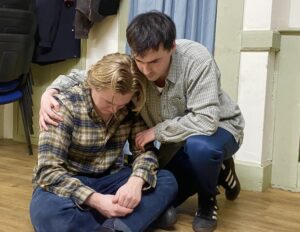
How have you found directing your own work?
This is the second time I’ve had the opportunity to write and direct my own work, but it’s still completely surreal. You spend so much time with the characters during the writing process, imagining how things will look and how lines might be said. It never ends up being exactly how you imagined it, but for all the best reasons. Seeing the work evolve through the rehearsal process is one of the most rewarding parts — the way the actors interpret the material, add their own nuances, and breathe life into the characters is incredible.
I’ve been so overwhelmed with how the actors have taken on their characters, thinking more about their back stories and asking such insightful questions; they’ve brought depth and complexity to the roles in ways I never anticipated. That realisation that the story is no longer just mine, but something shared, is so special. It’s so lovely to see other people interested and excited about what you’ve created, and what we’re now creating together!
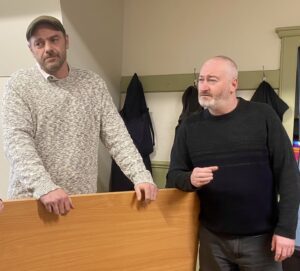
What themes does the play explore?
Jude explores that feeling of being stuck — not just physically, but emotionally. Set against the backdrop of economic decline in small-town Ireland, the play follows Ciaran as he grapples with feelings of entrapment and despair over his future. Diminishing job opportunities and a fear of losing everything weigh heavily on him, creating a sense of stagnation that contrasts sharply with his wife Áine’s longing for a more fulfilling life beyond Buncrana. That push and pull — between comfort and ambition, belonging and change — is at the heart of the play.
Writing it, I was really interested in exploring how hard it can be to communicate when you’re scared of what the other person might say. Ciaran and Áine love each other, but their different views on the future create this quiet tension that’s hard to resolve. It’s not about big arguments — it’s about the things left unsaid, the silences that weigh heavier than words. All of the characters struggle with communication, in one way or another. I really wanted to look at how people confront mental health; there’s so much discourse nowadays about having open and honest conversations about how you’re feeling, and I think the characters, and how they interact with each other, show how hard it can be.
Inevitably, religion is a huge theme throughout the play; Jude becomes a source of solace for Ciaran, but also a harsh reminder of the limits of faith in resolving real-world problems.
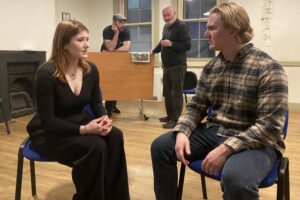
What have been the fun parts and the challenges for you in directing?
In almost every rehearsal we’ve had, I’ve found it difficult to stop laughing. The play is really sad in parts; at its heart, it’s a character study of a suicidal man who is struggling with unwanted change and what to do next. Nonetheless, the actors have done an amazing job at executing the humour I wove into the narrative, and it’s been a really enjoyable show to put together, despite the overarching bleakness.
At first, I found it difficult to have belief in my writing and my show. SLT puts on so many amazing productions, predominantly from published playwrights, and I often wondered if the play was good enough to be such a huge commitment for the actors and production team. I’ve slowly been able to let this go, seeing how excited everyone has been about the show, and how much they have resonated with the characters and the themes of the play.
As you’ll see, we incorporate four spaces into the stage; the home, the pub, the church, and outside. It’s been a challenge to move between these spaces, and make them distinct. We’ve done a lot of work on walking in the outside, and this was probably the most difficult part to block, but we’ve gotten there. Also, several drinks are had throughout the play; who’d have thought the logistics of an imaginary pint could be so challenging?
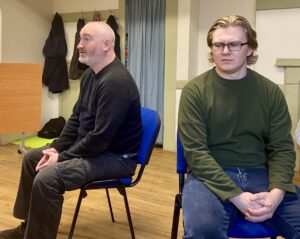
Tell us about the characters we'll meet
Ciaran (Johnny Ray Brolly) is a deeply troubled and hopeless man. He has been made redundant from the only job he’s ever had, at a clothing factory in his hometown, which has left him grappling with a sense of inadequacy. Ciaran struggles to articulate his feelings, and often resorts to prayer as a means of seeking help, reflecting a desire for something greater than himself to intervene.
Áine (Ella Pernet Molloy) is Ciaran’s wife, characterised by her artistic aspirations and a strong desire for a life filled with inspiration and culture. She feels stifled by her current circumstances, yearning for change and growth. Throughout the play, she grows frustrated with her husband’s complacency, and grapples with the tension between her love for him and her need for fulfilment.
Father Emmett (Jason Moran) is the local priest who means well, but often misses the mark in his guidance. He represents a traditional authority figure, but is somewhat out of touch with his parishioners, often making irreverent comments that do little to comfort those who seek his advice. Despite his faults and quirks, he genuinely cares for his community, and tries hard to offer support and comfort to Ciaran.
Eamonn (Carl Manzi) is the pub landlord and a close friend of Father Emmett. He serves as a sounding board for Ciaran and Father Emmett, providing a more grounded perspective on the challenges facing their community. He’s pragmatic and empathetic, and understands people more than they realise.
Finally, Jude (Darah Griffin) is the patron saint of hopeless causes, appearing to Ciaran as a manifestation of his desperation. He serves as a catalyst for Ciaran’s self-reflection and personal growth. He’s witty, sincere, and is Ciaran’s closest confidant and his best friend by the end of the play (albeit a strange, imaginary one).
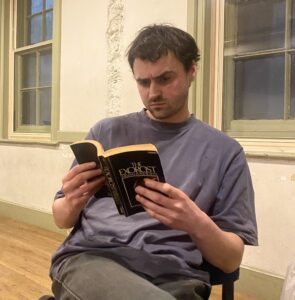
Describe the play in three words
Sad, saints, stout.
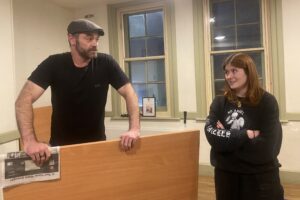
Jude plays 8pm 22 – 26 April 2025 at the SLT Fire Station. Buy tickets here